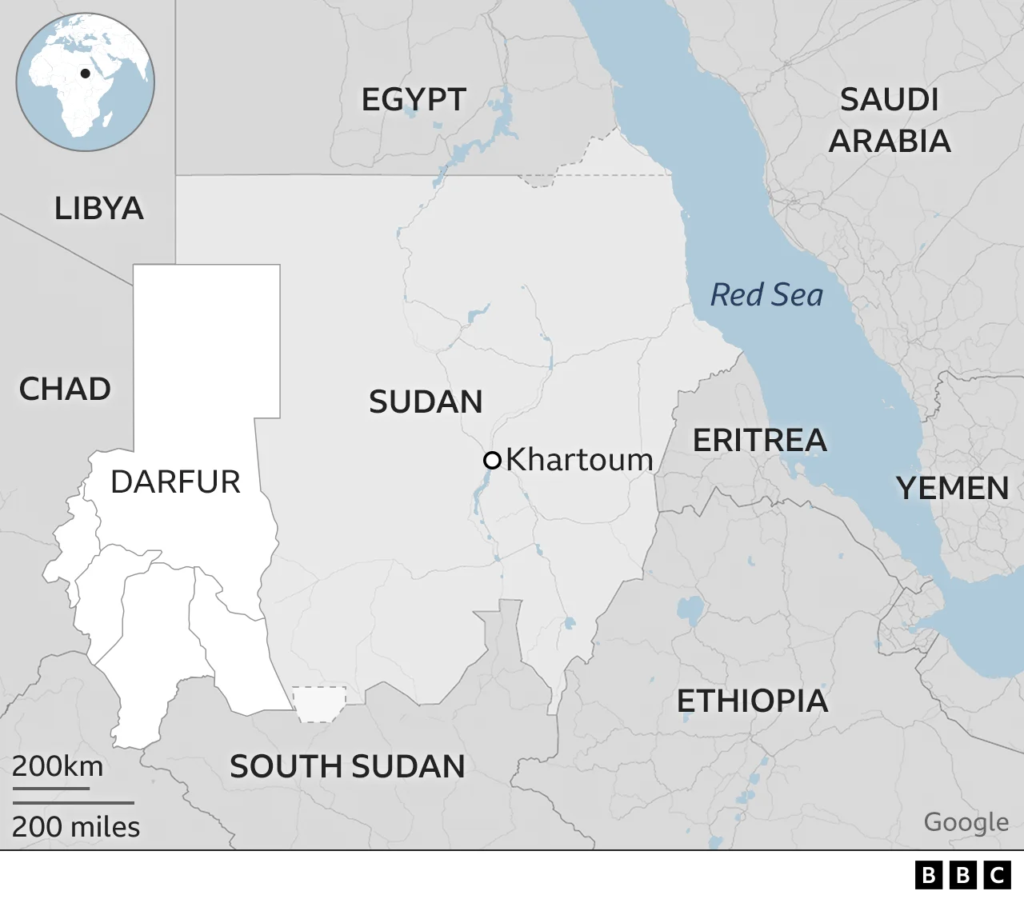
One of Sudan’s duelling generals, who leads the paramilitary force fighting the country’s army, has told the BBC he will not negotiate until fighting ends.
But Gen Mohamed Hamdan Dagalo, better known as Hemedti, said his fighters were being “relentlessly” bombed since a three-day truce had been extended.
“We don’t want to destroy Sudan,” he said, blaming army chief Gen Abdel Fattah al-Burhan for the violence.
Gen Burhan has tentatively agreed to face-to-face talks in South Sudan.
Thursday night’s extension of an uneasy ceasefire followed intensive diplomatic efforts by neighbouring countries, as well as the US, UK and UN.
As of Saturday air, tank and artillery strikes are continuing in parts of Khartoum, making the prospect of any wider dialogue between the two rival military factions seem remote.
Speaking to the BBC by phone, Hemedti said he was open to talks but the condition was that the ceasefire should hold: “Cease hostilities. After that we can have negotiations.”
He said he had no personal problem with Gen Burhan, but regarded him as a traitor for bringing into government those loyal to former President Omar al-Bashir, who was ousted by the army and RSF together in 2019 after mass street protests.
Bashir’s regime – in power for three decades – was known for its Islamist ideology and imposition of a strict version of Sharia (Islamic law).
“Unfortunately Burhan is being led by the radical Islamic front leaders,” Hemedti said.
In 2021, he and Gen Burhan overturned an agreement to share power with civilians, taking full control in a coup.
They fell out this year over the proposed return to civilian rule, in particular about the timeframe of incorporating Hemedti’s 100,000-strong Rapid Support Force’s (RSF) into the army.
“I am looking forward to having the civilian government today – before tomorrow, a fully civilian government. This is my principle,” Hemedti told the BBC.
This is not the first time the RSF leader has spoken of his commitment to democracy, although analysts point out that his forces have brutally put down civilian protests in the past.
Hemedti told the BBC that his RSF fighters were not the enemies of the military soldiers, explaining they were battling to protect the country from “the relics of the government of the past 30 years”.
“We won’t fight you. Please go back to your army divisions and we won’t fight you.”
Fears grow as violence spreads
Hemedti’s comments to the BBC come as millions remain trapped in the capital Khartoum, where there are shortages of food, water and fuel.
In some parts of the city, trenches have been dug as rival troops battle each other street by street, AFP reports.
The UN says RSF troops are forcing people from their homes and looting and extortion is taking place.
However, Hemedti told the BBC his rivals were dressing up in RSF uniforms in order to discredit his fighters.
He categorically denied involvement in looting and taking over hospitals, saying his troops were trying to help residents of a city reeling from fierce clashes that began 14 days ago.
“My team is working on the water and electricity supplies for the areas we control. Unfortunately all the technicians and engineers have disappeared. And this is our main problem,” he said.
At least 512 people have been killed and 4,193 wounded in the fighting, according to health ministry figures, although the real death toll is likely much higher.
The UN says hundreds of thousands of Sudanese have now fled their homes, often paying huge sums to leave and facing abuses en route.
As well as the thousands of foreigners who have been evacuated, tens of thousands of Sudanese have crossed into neighbouring countries, including Chad, Egypt and South Sudan.
Reuters reports a UN official as saying some have walked from Khartoum to South Sudan’s border, a distance of more than 400km (250 miles).
Earlier a Turkish evacuation plane was shot at as it was landing at an airport outside Khartoum. No-one was injured and the RSF denied accusations by the army that it was involved.
Those remaining in Khartoum describe living in a “constant state of fear”.
“We hear the sounds of planes and explosions. We don’t know when this hell will end,” 65-year-old Mahasin al-Awad, a resident of Bahri, a northern area of Khartoum, told Reuters.
Violence is reported to have been particularly bad in El Geneina, a city in Darfur in western Sudan, where the RSF and militias linked to the group are reported to have looted and torched markets, aid warehouses and banks.







